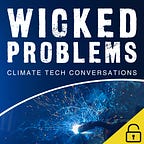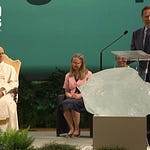Welcome back. Are you Zen now or still want more winning?
Outro Track of the Day
All will become clear.
Under a White Sky
It didn’t take a genius to figure out that passing 1.5C would result in previously-taboo ideas like scaling carbon removals and solar geoengineering would rapidly get traction in the mainstream discourse. I know it doesn’t take a genius because I wrote that >18 months ago.
And as my bank manager and inlaws will (eagerly) tell you – “wait you’re quitting corporate... and… just as the political winds turn against it you’re going to…double down on a ‘media thing’ on climate and climate solutions?” – I am not a genius.
One of the nice things about making yourself an outsider is you’re both blithely unaware of the tribal shibboleths you might be violating and just try to follow arguments where they lead.
Anyway, here we are in April 2025 and geoengineering – Solar Radiation Modification, SRM, of whatever flavour, is building up to a moment. We’ve been seeing the signs for a while and you can check out our previous SRM episodes with SilverLining:
and The Degrees Initiative:
Degrees Initiative, Centering the Global South
It’s the best of times, it’s the worst of times. I don't know about you, but the whipsaw between good news, bad news and really, really dire news is…a lot. And it’s not going to get any better any time soon.
…the Bristol-based NGO acting to make sure that any research on solar geoengineering foregrounds actual science from actual scientists working in the actual countries that have the most to lose from both climate change and from solar geoengineering if it goes wrong.
But now we may be headed to a crescendo:
Item: Guardian, 7th April, Britain’s OG climate hawk David King.
Headline: We passed the 1.5C climate threshold. We must now explore extreme options.
Privately, many scientists acknowledge the need to advance research into these solutions, but there is a widespread reluctance to say so publicly. I understand this trepidation – some fear backlash, while others worry about giving ammunition to those who would use climate repair as an excuse to delay emissions reductions. There are also many who object on ethical, political or environmental grounds, often for entirely understandable reasons. We must respect these concerns and ensure that any research is conducted transparently, with input from affected communities and with the free, prior and informed consent of Indigenous rights-holders.
Yet, my question remains: if not now, then when? The climate crisis is worsening before our eyes. We cannot afford to remain silent on the necessity of responsible research into nature-based climate repair. We must explore these approaches as part of a holistic climate response, not in place of deep emissions reductions, but as a complement to them.
Item: Bloomberg, 3rd of April with reporting from Will Matthis:
Headline: UK Launches £10 Million Study on Blocking the Sun to Reverse Global Warming
…funded by the National Environmental Research Council.
“The UK’s priority is to tackle the root cause of climate change by reducing emissions of greenhouse gases from human activities and adapting to those impacts that are unavoidable,” NERC’s Executive Chair Louise Heathwaite said in a statement. “However, with the increased interest internationally in solar radiation modification measures, there is a pressing need to consider the impact.”
Item: the EU’s scientific advisors have been pushing for a moratorium on SRM. Tomorrow researchers from a consortium called SRM360 are hosting a panel discussion. Including researchers Peter Irvine from the University of Chicago and Josh Horton of the Harvard Kennedy School of Government. So here’s my interview with them in case you want to check it out and maybe attend the discussion tomorrow.
One thing for comms pros: having thought about it, the debate about whether the best analogy is Ozempic or Chemo for geoengineering is timelier than ever. This was a pretty persuasive case that telling people “we need to do this and it’s going to hurt - a lot” might be a wakeup call. But that’s going to become a live debate.
Discussion
For example, check out tomorrow’s discussion about the growing debate surrounding moratoria and bans on solar geoengineering, otherwise known as solar radiation modification (SRM).
Josh Horton - Senior Program Fellow, Solar Geoengineering at Harvard Kennedy School.
Julie Vinders - Senior Research Analyst at Trilateral Research.
Joe Sonka - Kentucky State Government Enterprise Reporter.
Craig Seagall - Senior Environmental Policy Expert.
‘Making sense of calls for bans and moratoria for solar geoengineering.’
April 9th, 4:00 pm GMT / 10:00 am ET
Thanks
There’s a lot going on, to be sure. And we hope we’re getting the balance right here at wicked problems – we sure would love your feedback to let you know how we can serve you better. And we definitely would love it if you helped spread the word by leaving a rating and review on the pod platform of your choice, or Youtube, and if you’d like the full ad-free experience plus the newsletter and exclusive content come on over to wickedproblems.earth. Most of our stuff is free but we really need your help to keep this going. My inlaws and bank manager thank you in advance.
Outro Tracks in Full
Keep the faith. Back soon.




















